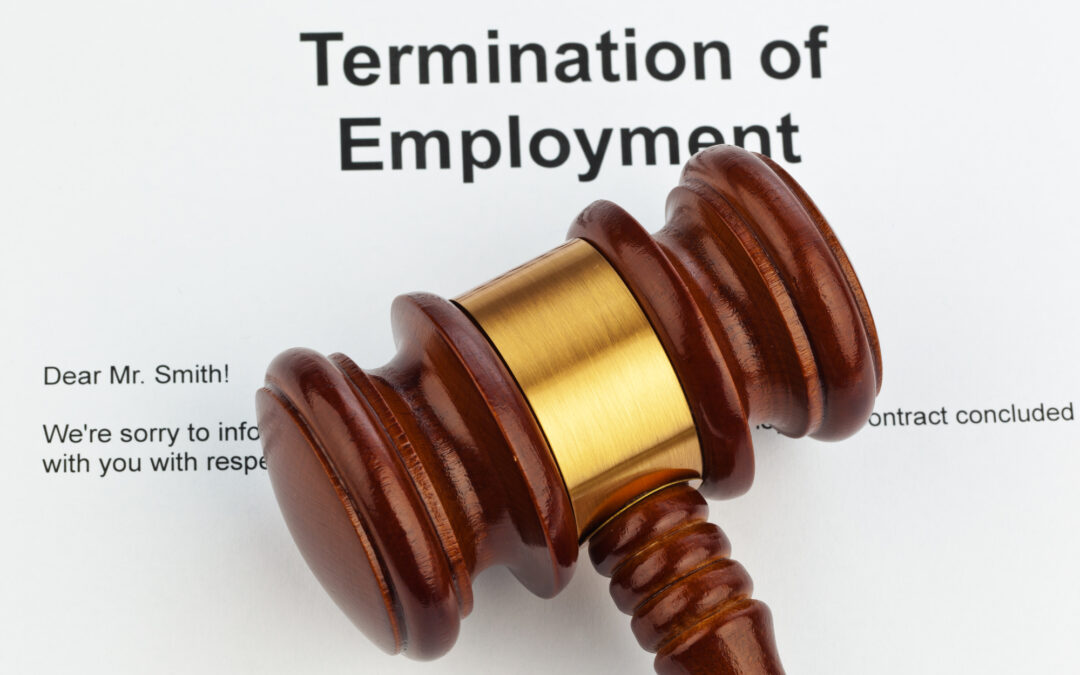WHAT TO DO (AND NOT TO DO) WHEN YOU ARE BEING TERMINATED FROM YOUR JOB
Ok so you’ve been called into the boss’ office and Human Resources is sitting in. It is only natural that your hands get a little shaky and your blood pressure skyrockets. You feel the panic rising. You’re definitely not thinking straight. When they deliver the bad news, your mind goes blank. What do you do?
First and foremost… don’t panic. Here’s a quick reference of things to do — or not — to help you think clearly when you get the unfortunate news that you’ve been fired or laid off.
DO’S
Do work as long as you can.
- If they are giving you the option to work for a few more weeks or months, do say yes. It’s way easier to get a job when you have a job. Take that time to send out resumes and pound the pavement. Just make sure you still do your job while you’re there, and don’t start copying trade secrets or confidential information. That will just get you into trouble.
Do ask about getting your personal items.
- Many people leave their belongings behind. Security or HR might have to accompany you but do get your stuff. They aren’t allowed to keep your belongings. On the other hand, if it’s in your work computer, your company phone, a company notebook, or something else they own, it’s theirs. They don’t have to let you print or copy anything that’s in their property.
- If it’s important, keep it in your briefcase, your purse, or at home so that this doesn’t happen. If you’ve, for instance, been keeping a log of every sexually harassing comment that was made, you may lose it now. That’s why you never keep it on your work computer.
Do ask about your insurance.
- Are they cutting off your insurance that day, at the end of the month, or later? If you have an upcoming doctor’s appointment or surgery, you need to know ahead of time whether or not you’ll be listed as covered.
- If coverage is getting cut off, it will be reinstated retroactively once you elect COBRA and make your payment. If you paid your share of insurance through the end of the month, remind them. They may extend your insurance at least through the time you’ve paid or refund you the difference.
If no severance is offered, do ask about it.
- They may offer it if you ask. Don’t agree to or ask for any amount on the spot (you’re not thinking straight, remember?) You might want to talk to an attorney to see if you have potential claims against them before you decide on an amount. If they do offer severance, ask them to put it in writing. Get legal advice before you agree to anything you don’t understand.
Do ask if the company has a severance plan or policy.
- You’d be surprised how many have written severance plans that don’t require a release, yet they try to get you to sign one anyhow. Or they try to throw in a noncompete agreement that’s not required.
- If you’re already entitled to severance without signing anything, then maybe you can negotiate more in exchange for a release or noncompete agreement.
Do ask when you’ll get your final check.
- Some states have deadlines for employers to pay, some do not. Don’t assume you’ll be paid in the next pay period.
- Also, if you’re owed commissions, find out if they intend to pay them. If there are deals you’ve made that are in the pipeline, they may owe you money once they close.
Do ask why you’re being terminated.
- In many states they don’t have to give a reason. However, if they refuse to give you a reason, or give you a different reason than they give to unemployment or the EEOC, that may help you with your legal claims down the road.
If they claim you signed a non-compete or confidentiality agreement, do ask for a copy.
- You need to understand what you signed. Many employers don’t provide copies when you sign these agreements at the beginning of your employment. But if they want you to comply, they have to give you a copy so you understand your restrictions.
- If they won’t give a copy, or if you think your agreement might not be enforceable, contact an attorney.
Do ask what co-workers and potential employers will be told.
- It’s important to know what to say to potential employers. It’s also important to make sure the company rumor mill isn’t fed with misinformation. Get on the same page with them if you can.
If they ask you to resign, say no.
- Unless you’re being offered substantial dollars in exchange for a forced resignation, what’s your upside? You’ll probably be disqualified from getting unemployment. You may accidentally give up some discrimination, whistleblower or other claims.
- Some people think it looks better to potential employers to say you resigned, but really, who do you think you’re fooling? In this economy, almost nobody resigns without having another job lined up. They’ll know something bad happened, so why make it easier on the former employer by quitting?
If you do have access to your computer and documents, here’s what you do want to collect before you go:
- documentation of anything they owe you (commissions, bonuses, contracts, etc.)
- proof of any deals still in the pipeline you think you may be entitled to be paid on after you leave
- any evidence of age, sex, race, national origin, religious, disability, or other discrimination or harassment
- copies of all employment agreements, confidentiality agreements and noncompete agreements you signed
- your performance reviews, evaluations, commendations, awards, write-ups, disciplines, recommendation letters — anything you can get about your performance, bad or good
- anything else you think might be useful to a lawyer or to unemployment
DON’TS
Don’t sign anything.
- You aren’t thinking straight. When they shove a severance agreement, disciplinary report or other paperwork in front of you, take a deep breath, and ask for a copy to review. Take a look at it once you’ve had a chance to calm down.
- If there’s anything you don’t understand, take it to a lawyer to have it reviewed before you sign. You may be giving up rights you shouldn’t, or maybe you have some leverage to negotiate for more money.
- You especially don’t want to accidentally sign a noncompete agreement that limits your ability to work for a year or two, unless you understand it and are getting some substantial dollars for it.
Don’t yell, curse or make a scene.
- You don’t want to burn bridges. You still need these people, as much as you hate them right now. They will be on your resume for many years. They’ll have to give references on you.
- Plus, if you tick them off they’re more likely to challenge your unemployment. They can make your life even more miserable right now, believe it or not. I’ve known many employees who were fired or laid off and who ended up getting rehired down the road.
If you believe they got it wrong, don’t argue or beg.
- If they got the wrong person or there’s something you can prove is incorrect, you can tell them calmly. However, very few employers will change their minds at this point.
- If your proof is at home or is something you need to provide in writing, then wait until you’ve cooled off, put together your information in a business-like fashion, and send it later.
- They may have an appeals or grievance process. Follow it.
Don’t admit to a crime or wrongdoing.
- Sometimes, the employer will lock you in a room with Loss Prevention and say you can’t leave unless you sign something admitting that you stole inventory or did something wrong. Don’t do it. You’re already going to be fired — don’t let them fool you. “Just sign and you’ll still have your job,” they might say. They’re lying. The only question is whether you’ll also end up in jail or with a big judgment against you.
- If they say you can’t leave, open the door and go anyhow. If they block the way, pull out your cell phone or pick up the phone in the room and call 911. If you don’t have a phone and they block your way, demand to be allowed out. If they still won’t let you go, scream at the top of your lungs for help. That’s the one time I recommend making a scene. (Don’t touch anyone though). Eventually you will be allowed out of the room. Call 911 the second you leave the premises and tell the police what happened. Then call an employment attorney (or criminal defense attorney if you need one) and get advice.
But whatever you do, don’t sign something admitting to a crime. Ever.
Don’t demand to say goodbye.
- You don’t have the right to have a big farewell scene with co-workers. You’re upset and will probably embarrass yourself. If co-workers approach you right after you’ve been fired, stay calm. Don’t badmouth the company or the boss. Leave with class and you may keep the doors open to come back someday.
- While being fired is right up there with a death in the family as one of the most stressful things that can happen to you, with lots of self-control and a little preparation, you may help ease your transition a bit. If you do have any potential claims against the company, you hopefully won’t have done anything to damage your case. More importantly, you won’t have burned any bridges.
The Van De Water Law Firm, P.C. specializes in protecting your rights during the difficult process of job termination. We are here to counsel you through the process in the event that your employer unlawfully terminated you or you were the victim of discrimination or sexual harassment. We are conveniently located in both Nassau and Suffolk Counties and can be reached at 516-400-4142 or 631-923-1314. You can also find us on the web at Chrisvandewater.com.


Recent Comments